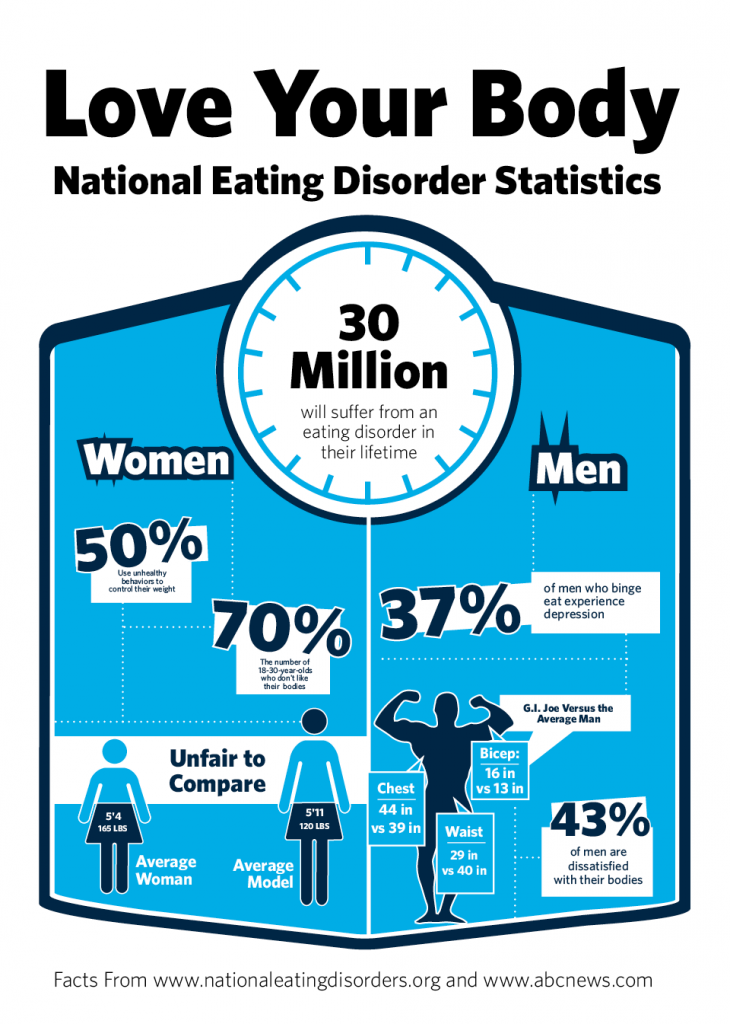
You are not alone
– the reality of eating disorders
Cover Photo: https://thebodyimagecenter.com/education-awareness/eating-disorder-statistics/
The average American teen spends more than 11 hours a day using social media. That is more than the average time spent sleeping, in school, or working each day. I bet that more than half of the people reading this have at least one social media app on their phone and that if a notification comes through when reading this article, it will be attended to, and this article abandoned. Don’t get me wrong, there is nothing wrong with a little bit of Instagram or TikTok bingeing. What I want to address is when you’re scrolling through TikTok and you see someone very thin and attractive doing a dance and you think to yourself, “I would do anything to look like that.” Or when you can’t stop seeing the “what I eat in a day” videos and Chloe Ting’s “perfect hourglass workouts” everywhere. Not to mention when you go on Instagram and see stunning pictures of celebrities and others you follow, and you start holding yourself to those impossible standards. We all do it, we judge ourselves and each other constantly, but unfortunately, we will always be our own worst enemy. Society’s obsession with having the perfect body- perfect everything is becoming increasingly detrimental to our self-worth and is one of the leading causes to the development of eating disorders.
You never know when someone is struggling with an eating disorder. My goal for this article is for us all to gain awareness and to think before we talk or post about something that may be a trigger for someone suffering from an eating disorder. In order to get a better understanding of eating disorders in our community and learn ways we can support others; I asked some students at Nease who were willing to share their stories anonymously. Almost everyone who responded said that social media had some role in the development of their illnesses. One student shared, “I believe social media is one of the main reasons I felt the way I did because on social media apps like TikTok, there’s a lot of pretty skinny girls and a lot of posts basically encouraging people to develop eating disorders.” Some people mentioned they felt that it’s almost like people on social media try to glorify having an eating disorder… like it is some type of “trend.” In my personal experience, I have seen it so many times, and it needs to stop. We need to do more to be considerate of those struggling. When you make a point to post about what you ate, or didn’t eat, today – it affects other people even if you were just trying to be inspiring.
What can society do to better this issue? Here is what some of the students shared with me that they think could help. “As a society we should normalize the fact that just because someone is bigger or smaller doesn’t mean they should be treated differently than one another.” Also, “I do think we should not spread the idea of its ok to be overweight but spread the idea of loving someone for who they are.” The most important thing is to love yourself; we are all beautiful no matter what our bodies look like. In the end, we are all human and what really matters is who we are not what we look like. What’s the point if you have “the ideal body” but you are miserable, or treat others badly?
Just because someone has an eating disorder, you don’t need to walk on eggshells around them, it means you simply need to be more considerate about what you’re saying and posting. We must realize that anyone can have an eating disorder, and the stereotype is that it is only body shaming when you call someone out for being overweight. Many times, people feel the need to comment on a skinny person’s body, but that is just as bad because it makes them just as self-conscious and they feel like they need to change something about themselves. We can also recognize it’s not just girls who have eating disorders, guys still feel pressure to have the ideal “muscular built body” in order to be found attractive. National Eating Disorder Association statistics show “Subclinical eating disordered behaviors (including binge eating, purging, laxative abuse and fasting for weight loss) are nearly as common among males as they are among females.” Essentially, you cannot stereotype a mental illness, be considerate of what you say because you never know what someone is going through an you should never assume.
What can we do to personally overcome the battle with food? I received some great suggestions from those who contacted me. One of the best things is having friends or family that support you, it helps to enjoy a meal with them, it will distract you from worrying about food. If you don’t have that kind of support system, it’s also helpful to eat in an environment where you are comfortable, for example eating on the beach or your favorite park. One student shared, “My therapist told me that if you accept compliments, you’re more likely to believe them.” I think this is an excellent suggestion because whenever someone compliments me sometimes it’s hard to believe them. But why would someone make the effort to compliment you if they didn’t believe it was true? Accept your compliments and embrace them confidently! Some other recommendations are to delete any calorie counting apps you may have, try not to weigh yourself, and stay away from diets unless they are directed from your doctor. Ultimately, food is fuel. Eating healthy food is going to be so much more beneficial for you than depriving your body entirely. Social media, pressure from peers/family, and mental health in general are key influences for eating disorders. Most people felt that the challenges can be prevented and overcome. Ultimately, the advice is to love yourself, be kinder to yourself, and realize that calories or weight don’t matter in the end. They are not what defines us and are most definitely not the key to happiness.
It will take more than just staying away from diets and comparing ourselves, it will take a societal shift to eliminate and recognize that thin is not the only way to be beautiful. So why don’t we come together and contribute to that shift? We have more than 3,000 people on campus and most of us use social media. Instead of putting each other down, why don’t we make it a point to lift each other up and make others aware of this issue. With your help we can turn the problem into the solution.


